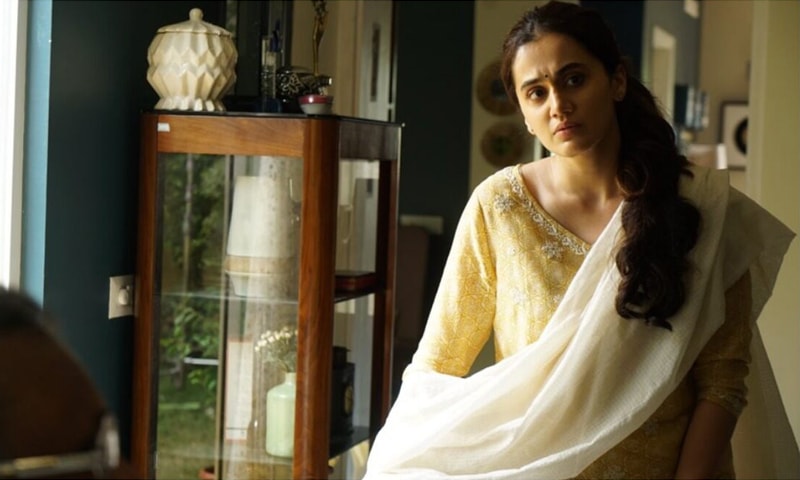Hindi cinema has been in love with status quo for long. Bollywood has protected, showcased, and celebrated it, mainly through the stories of affluent, caste Hindus. When a story is repeated for long, then it no longer remains a story, it becomes the story. But in the increasing herd of numerous soulless directors — especially over the last few years — at least one has found his sense of purpose, his soul: Anubhav Sinha.
His 2018 drama, Mulk, tackled Islamophobia. His Article 15 examined the caste divide. His latest, Thappad, starring Taapsee Pannu, is centred on the trauma and despair of a woman slapped by her husband. Religion, caste, and gender —Sinha is not just telling stories; he also seems to be telling a story about telling stories. These are not movies as much as confessions, an act of self-exoneration.
Further, his recent films, also well-made, are bigger than the subjects they portray. What’s initially striking about Thappad, too, is the small things it gets right. A story of a housewife, Amrita (or ‘Amu’), it understands a crucial facet of her life: the lyrical routine of everyday living.
The dawn breaks, a newspaper is lobbed to the front door, soon followed by two bottles of milk. She shuts the alarm, gets up, picks them up. Opens the balcony door, waters the plants, makes tea. Serves breakfast to her husband, sees him off, and hands him his wallet and bag. Even before her husband, Vikram (Pavail Gulati), has left for office — made himself ‘useful’ in the eyes of society — Amu has worked for at least a few hours: work that will not get recognition or reward. Work that is not even considered work.
Director Anubhav Sinha delivers another movie that tries to disrupt Bollywood’s status quo-reverential stories
Like the nature of that work, the film doesn’t make a big deal about those scenes — it simply repeats them as a matter of fact at least half-a-dozen times. So that we know, so that we realise. That is the best thing about Thappad: it shows us a reality, a story hidden in plain sight all along. A story so ubiquitous that we don’t even think of it as one.
The other impressive bit about the movie is its range of supporting characters, and how their stories feel similar. Besides the married couple, Thappad introduces us to Vikram’s mother (Tanvi Azmi); their house help (Geetika Vidya Ohlyan) and their neighbour (Dia Mirza); Amu’s mother (Ratna Pathak Shah) and father (Kumud Mishra); and her lawyer (Maya Sarao). All these characters have backstories and inner lives; some have conflicts, some regrets. In most Bollywood films, the hero’s story exists above — and often at the cost of — other stories. But in Thappad, a drama where a woman is the hero, there’s no self-absorption, only accommodation. The film smoothly cuts among these lives — each story provides an extra layer of meanings to a movie that, to begin with, has no dearth of them.
The central conflict appears early. Frustrated about an upcoming project, Vikram gets into an argument with his boss, and accidentally slaps Amu in an ongoing house party. There are no further arguments. The party goes on, and Amu retreats to her room. The next day, too, everything is disconcertingly… normal. Vikram comes to her, holds her hand, and says, “You know how things have been. I was so stressed last night.” He doesn’t say sorry. He then talks about himself. Amu keeps quiet.
Sinha then cuts to a conversation between the house help and her husband, “I don’t know why I get worried. Everyone slaps after all.” Later, with respect to his job, Vikram says, “Amu, I don’t want to stay in a place where I’m not valued” and on a subsequent evening, “Amu, I tell you. Put your bloody foot down in life.” It’s as if the film is unfolding in two parallel layers — one that is only accessible to Vikram and the other to Amu, to us.
By filming these scenes life-like, Sinha repeatedly arrives at a larger truth: that this is how it feels — a mundane reality that so many, including this writer, are often unaware of. A pattern that Bollywood — and this society itself — has repeated through the decades. What we experience throughout Thappad is not just heartbreak and compassion but something we’re not ordinarily used to: shame. That despite our ‘best intentions’ this happens, that you don’t really need to look or sound like a villain to be one yourself. Even when Amu moves to her house, she sees in her brother — dependent on his wife without appreciating her importance — shades of Vikram, perhaps shades of all men.
Thappad though isn’t a film that is cut from the same fabric of #AllMenTrash. Despite being alive to systems of oppression, it is gentle. It’s a film about muted grievances, yet it’s not angry. Not loud, yet holds its ground — and more importantly, doesn’t give anyone an easy pass or lowers the standards of acceptable behaviour.
It’s significant to remember that Thappad has released only eight months after Kabir Singh, a celebration of misogyny that was the second-highest grossing Bollywood film of last year. In the dark by-lanes of status quo-reverential Bollywood, Sinha has lit a match. Now it’s up to the audience whether it wants to see the light. — By arrangement with The Wire, India
Published in Dawn, ICON, March 8th, 2020
















































Dear visitor, the comments section is undergoing an overhaul and will return soon.